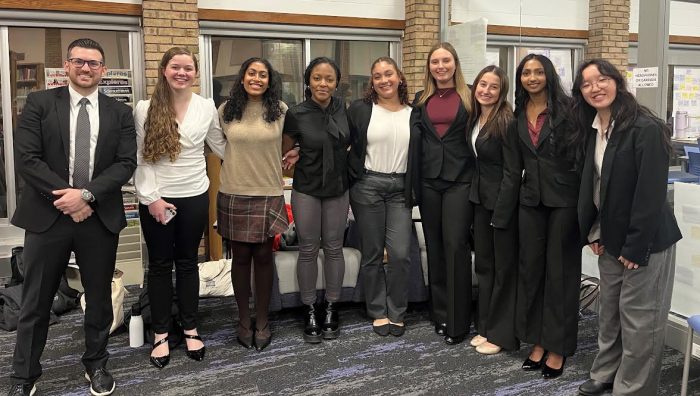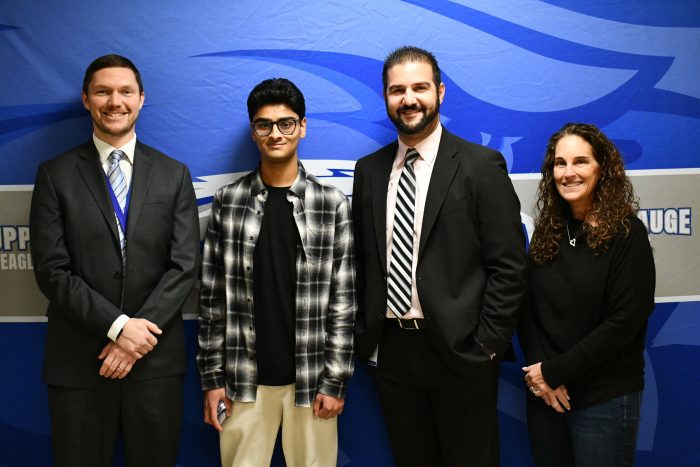By Richard V. Acritelli
This year’s valedictorian of Rocky Point High School is Matteo Gravinese. He will be attending Carnegie Mellon as an engineering and mathematics major next fall. This special young man holds an astounding 107.19 grade point average, and he is one of the most well-rounded student-athletes to have graduated from Rocky Point.
Gravinese, through a BOCES grant, has successfully completed college Calculus III and linear algebra and he enjoys studying how physics and math is applied to real life situations. Gravinese has a “fire” to understand the world around him and to put forth his best efforts to succeed at all endeavors. Achieving a perfect score on the American College Test (ACT) Exam was a proud moment for Gravinese. This National Merit finalist has constantly been placed on the Principal’s List, and is a member of the Science, Mathematics, English and National Honor Societies. Gravinese is also a drum leader in the marching band and taught himself how to play the piano.
Over the last four years, Gravinese ran varsity cross country and winter and spring track. He was the captain of the cross-country team for the last three years, a two-time all-league athlete and an academic all-county runner. Through Matteo’s disciplined training regiment, he established a sound example to the younger runners on how to best prepare for all types of practices and races. On May 30th, Gravinese took first out of 160 runners through the VFW Post 6249 Joseph Dwyer PTSD 5K Race. This year, Gravinese helped the spring track team win a league title and ran a 4:40 mile. In his limited amount of spare time, Gravinese provides a nurturing environment as a valued employee at the North Shore Youth Council.
A kind soul who is always pleasant and positive, Gravinese lost his father, Giulio Mario Gravinese, at thirteen years old. As a middle school student, Gravinese assisted his mother to care for his ailing father who suffered from cancer. During his earliest years, Gravinese handled family tragedy; he supported his mom and has been a strong role model to his sister Chloe.
Graduating second in the class is Zen Pinkenburg with a 104.81 grade point average. He will be attending Rensselaer Polytechnic Institute (RPI) to study aerospace mechanical engineering. Armed with a big smile, Pinkenburg stated that he was “a nerd from day one”. Pinkenburg has successfully completed every type of advanced placement honors course and taught himself college calculus. A constant fixture on the Principal’s List, Pinkenburg was accepted into the National, English, History, Math and Science Honor Societies. Pinkenburg works well with others through ornithology, chess and cricket and is president of the math team, secretary of the senior class and treasurer of the National Honor Society.
Pinkenburg thrived playing viola in the orchestra for seven years and has taught himself the saxophone. He has successfully entered aerospace mechanical engineering and robotics competitions. Pinkenburg produced research alongside sPHENIX collaboration, and with his good friend Om Patel, they moved to the second round of scientific research on calorimeter data reconstruction and competition that were both held at Brookhaven National Laboratory.
Pinkenburg garnered notoriety at the University of Arkansas “First Lego League” international event to place well in the robotics category.
Guidance Counselor Michael Conlon advises both Pinkenburg and Gravinese and said: “Matteo and Zen are two of the brightest students I helped guide through their high school careers and now through their future paths. These two young men share the gift of possessing the intelligence found only in a few peers their age who walk this earth. They represent the epitome of excellence; while uplifting those around them and both are motivated to achieve greatness now and in the future.”
Kaylie Michael is an enthusiastic young lady who has amassed a 104.18 grade point average, the third highest of the class, and she will be attending Cornell University next fall where she will pursue her goal of becoming a pediatric oncologist. She has been placed on the Principal’s List, gained a National Merit Commendation and the College Board Small Town Recognition. Managing multiple tasks, Michael enjoys volunteering her time at the Rocky Point STEM night.
Before her junior year, Michael enrolled in pre-calculus and linguistics at a summer educational program at Harvard University. Michael was accepted into a Brookhaven National Laboratory program that conducted studies on particular physics that simulated radiation in space. Demonstrating her academic versatility, Kaylie participated in a summer school law program at Columbia University and was pleased to examine criminal and constitutional law at this prestigious college.
An academically passionate young lady, Michael is the president of the Math Honor Society, secretary of the English and Art Honors Society, and was accepted into the National, English, Science and Mathematics Honor Societies. In her limited spare time, Michael relishes her role as a gymnastics coach at Spins, where she instructs the fundamentals of a sport that she loves. For the last several years, Michael is also a talented cheerleader, coaches younger girls, and recently performed well at a large competition at Wildwood, New Jersey. Amazed by her academic prowess, Guidance Counselor Mrs. Holly Rizzi said, “Kaylie Michael excels in every area of her life. Her intelligence combined with her incredible drive and ambition makes Kaylie an individual who will rise to overcome every challenge to continue her path to success!”
Michael’s parents are immensely proud of her for being the first member of their family to strive for a college diploma. Principal James Moeller is amazed at the abilities of these top three students at this high school as being “some of the most productive students that I have ever seen within my career as an educator and administrator. They are simply wonderful young adults who have made this district proud of their many triumphs.”





























